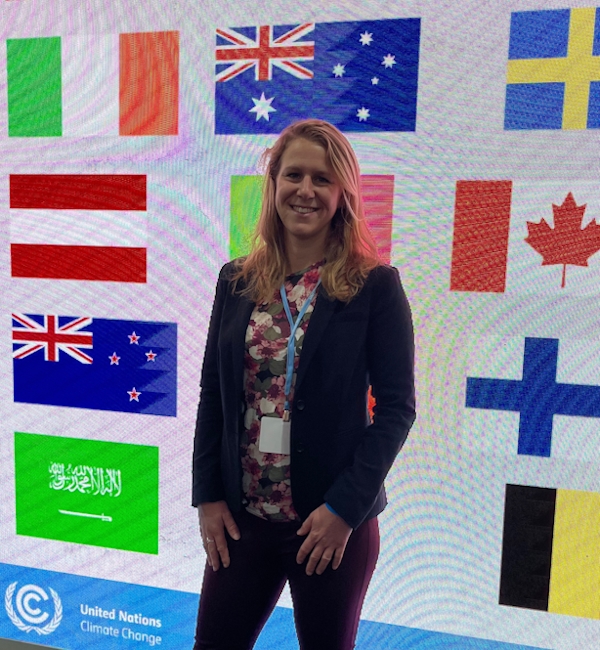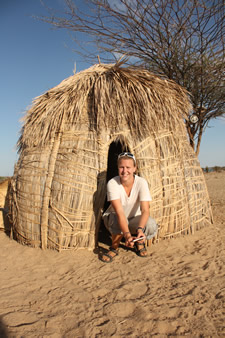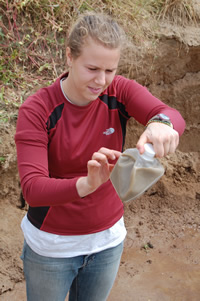Debbie Aller (BA, 2011)
 Deborah (Debbie) Aller graduated in 2011 with B.A. in Environmental Studies and Anthropology. She is currently an Extension Associate with Cornell University
and the New York Soil Health Program Coordinator. She is the first author of the Agriculture Chapter of the New York State Climate Impacts Assessment, which provides timely, relevant, and accessible information on the impacts of climate change
to all levels of decision-makers and the diverse communities that shape the state.
Deborah (Debbie) Aller graduated in 2011 with B.A. in Environmental Studies and Anthropology. She is currently an Extension Associate with Cornell University
and the New York Soil Health Program Coordinator. She is the first author of the Agriculture Chapter of the New York State Climate Impacts Assessment, which provides timely, relevant, and accessible information on the impacts of climate change
to all levels of decision-makers and the diverse communities that shape the state.
During her time at Stony Brook University, Debbie received the Chancellor's Award for Student Excellence, a prestigious honor given to premier student leaders and scholars throughout the State University of New York (SUNY) system. The award is the highest bestowed on undergraduates within the SUNY system and is given to less than one-tenth of one percent of all matriculated undergraduates each year. The Chancellor’s Award recognizes those special students who not only excel academically, but also demonstrate impressive accomplishments in the areas of leadership, athletics, community service, creative arts and/or career achievement.
The Chancellor’s Award is just one of a long list of honors bestowed upon Deborah. She excelled in academics – making the Dean’s list every semester – and sports – being a member of the women’s soccer team at Stony Brook. She was nominated by her coach and teammates for 2011 NCAA Woman of the Year. In September 2009, Deborah was recognized as Stony Brook’s Undergraduate Research and Creative Activity (URECA) researcher of the month, highlighting her URECA-sponsored research on water quality in Tanzania. Deborah was also awarded the Petra M. Udelhofen Memorial Scholarship and the Evan R. Liblit Scholarship from SoMAS for the 2010-2011 academic year. Both scholarships are awarded to students who exhibit high academic performance, service to the community and participation in research, and in the case of the Liblit Scholarship, waste management-related research.
 Deborah conducted scientific research throughout her academic career at Stony Brook.
In the summer of 2008, she participated in an independent study with the International
Academic Summer Program, monitoring drinking water quality in rural villages in Tanzania.
Her initial work revealed that half the villages had water sources that were below
the World Health Organization’s standards for safe drinking water. This prompted her
return to Tanzania in 2009 to a more arid region of the country, supported by both
URECA and SoMAS professor Dr. Kamazima Lwiza, where she investigated water quality
in an additional 15 villages. Deborah’s studies in Tanzania were prepared for submission
to a peer-reviewed scientific journal. Deborah also traveled to Fiji to learn about
shark biology and conservation, and she spent a semester abroad at the Turkana Basin
Institute Field School in Northern Kenya.
Deborah conducted scientific research throughout her academic career at Stony Brook.
In the summer of 2008, she participated in an independent study with the International
Academic Summer Program, monitoring drinking water quality in rural villages in Tanzania.
Her initial work revealed that half the villages had water sources that were below
the World Health Organization’s standards for safe drinking water. This prompted her
return to Tanzania in 2009 to a more arid region of the country, supported by both
URECA and SoMAS professor Dr. Kamazima Lwiza, where she investigated water quality
in an additional 15 villages. Deborah’s studies in Tanzania were prepared for submission
to a peer-reviewed scientific journal. Deborah also traveled to Fiji to learn about
shark biology and conservation, and she spent a semester abroad at the Turkana Basin
Institute Field School in Northern Kenya.
Of her work on potable water supplies in East Africa, Deborah says, “Traveling and conducting research in Tanzania really opened my eyes to the daily struggles of millions of people worldwide just to obtain basic necessities like food and water. My experiences have made me extremely appreciative of everything around me and have shown me cultures very different from my own.”
That Deborah should achieve excellence in research and education, and travel the world
in doing so, should perhaps come as no surprise. Her proud parents, Drs. Bob and Josie Aller, are professors with SoMAS.
Coming off her stellar undergraduate career, Deborah continued her education. She
went to University of Edinburgh in Scotland for her masters, and then to Iowa State
University for her doctorate. She returned to Long Island where she works with Cornell
University as part of the New York Soil Health team where she is focusing on applied research and extension activities in orchards/vineyards, urban
agriculture, and vegetables/horticulture crops.
surprise. Her proud parents, Drs. Bob and Josie Aller, are professors with SoMAS.
Coming off her stellar undergraduate career, Deborah continued her education. She
went to University of Edinburgh in Scotland for her masters, and then to Iowa State
University for her doctorate. She returned to Long Island where she works with Cornell
University as part of the New York Soil Health team where she is focusing on applied research and extension activities in orchards/vineyards, urban
agriculture, and vegetables/horticulture crops.
